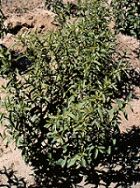 If you've ever tasted stevia, you know it's extremely sweet. In fact, this remarkable noncaloric herb, native to Paraguay, has been used as a sweetener and flavor enhancer for centuries. But this innocuous-looking plant has also been a focal point of intrigue in the United States in recent years because of actions by the U.S. Food and Drug Administration.
If you've ever tasted stevia, you know it's extremely sweet. In fact, this remarkable noncaloric herb, native to Paraguay, has been used as a sweetener and flavor enhancer for centuries. But this innocuous-looking plant has also been a focal point of intrigue in the United States in recent years because of actions by the U.S. Food and Drug Administration.
The subject of searches and seizures, trade complaints and embargoes on importation, stevia has been handled at times by the FDA as if it were an illegal drug.
Since the passage of the Dietary Supplement Health and Education Act (DSHEA), stevia can be sold legally in the United States, but only as a "dietary supplement." Even so, it can be found in many forms in most health-food stores, and is also incorporated into drinks, teas and other items (all labeled as "dietary supplements"). It cannot, however, be called a "sweetener" or even referred to as "sweet." To do so would render the product "adulterated," according to the FDA, and make it again subject to seizure.
The purpose of our Web site is to provide as much information about stevia as possible, from the scientific studies regarding its safety to the petitions submitted by the Lipton Tea Company and the American Herbal Products Association. Stevia.net will be an ongoing project for us at Body Ecology, so check back often, as we will be augmenting and updating this information frequently.
This is actually very interesting..thank you very much for the heads up....got to look into it a bit more...i guess this means I can't grom it....or if i do...does that mean i have to just label it as a dietary supplement....HAHAHAHA...can you smoke it hahahahaha
 If you've ever tasted stevia, you know it's extremely sweet. In fact, this remarkable noncaloric herb, native to Paraguay, has been used as a sweetener and flavor enhancer for centuries. But this innocuous-looking plant has also been a focal point of intrigue in the United States in recent years because of actions by the U.S. Food and Drug Administration.
If you've ever tasted stevia, you know it's extremely sweet. In fact, this remarkable noncaloric herb, native to Paraguay, has been used as a sweetener and flavor enhancer for centuries. But this innocuous-looking plant has also been a focal point of intrigue in the United States in recent years because of actions by the U.S. Food and Drug Administration.